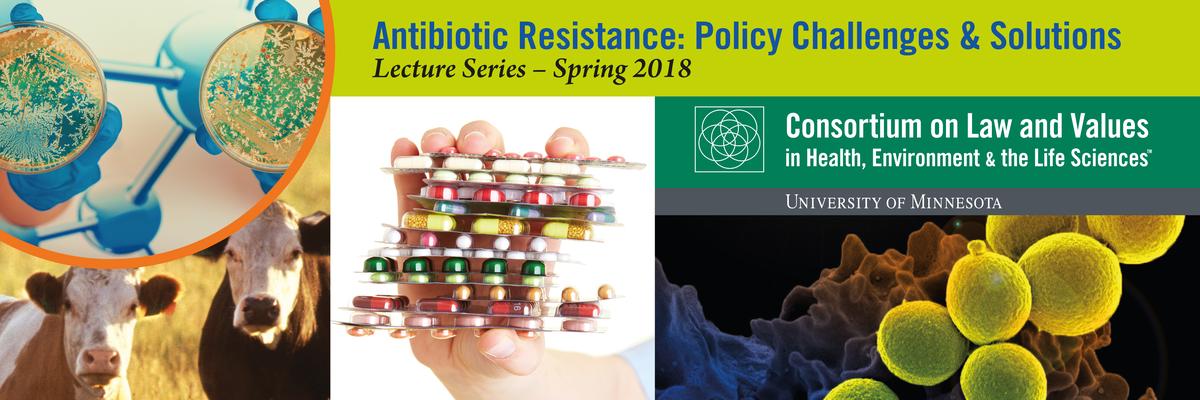
Wednesday, February 28, 2018 - 11:30am to 1:00pm
Mississippi Room, Coffman Union
Considerable disagreement exists over the definitions of prudent antimicrobial use and stewardship in agriculture and food production. This arises from a fundamental problem: so-called objective science remains insufficient for determining what is judicious – or injudicious – use, simply because any use of an antimicrobial will apply pressures that select for resistant bacteria. Justifiable antimicrobial use policies, therefore, are not for science alone to decide; they can only be properly deliberated through broader public discourse. To be credible, such a conversation needs to fully consider social norms, moral imperatives (to both humans and animals), and ethical features that should frame future antimicrobial stewardship practices. In his talk, Prof. Scott explored these issues using real examples from around the world and the United States, reflecting policy decisions at farm, industry, country, and global levels. He then examined longer-term, more sustainable approaches to antimicrobial resistance that go beyond the technical to fully account for the conflicting moral obligations inherent in balancing animal welfare and public health.
Resources:
- Interview with Food and Agriculture Organization of the United Nations (June 22, 2016)
- Prof. Scott will discuss the following publications:
- Report: "Guidelines on Use of Medically Important Antimicrobials in Food-producing Animals," World Health Organization (Nov. 7, 2017)
- Response: "USDA Chief Scientist Statement on WHO Guidelines on Antibiotics," (Nov. 7, 2017)
- Response: "NPPC Statement On WHO Call For Ban On Prevention Uses Of Antibiotics," (Nov. 7, 2017)
- Response: "WHO antimicrobial guidelines fall short of protecting human and animal health," (Nov. 10, 2017)
- Article: WHO seeks end to antibiotic use without disease (Dec. 13, 2017)
- Report: "Critically Important Antimicrobials for Human Medicine, 5th revision," World Health Organization (2017)
- Article:"Are Antibiotics Turning Livestock into Superbug Factories?" Giorgia Guglielmi, Science Magazine (Sept. 28, 2017)
- Report: "Tackling Drug-resistant Infections Globally," Review Committee on Antimicrobial Resistance, Jim O'Neill, Chair (May, 2016)
- Report: "Guidelines on Use of Medically Important Antimicrobials in Food-producing Animals," World Health Organization (Nov. 7, 2017)
- Report: Combating Antimicrobial Resistance: A One Health Approach to a Global Threat, National Academies of Sciences, Engineering and Medicine (Dec. 8, 2017)
- Article: "High Levels of Antibiotic Resistance Found Worldwide, New Data Shows," World Health Organization (Jan. 29, 2018)
- The Antimicrobial Stewardship Project of CIDRAP (the Center for Infectious Disease Research and Policy), a Consortium member, is a comprehensive repository of accurate, current reporting on this and related topics. Visit their website here.
Provided by the Consortium on Law and Values in Health, Environment & the Life Sciences in collaboration with the Center for Infectious Disease Research and Policy (CIDRAP) and Microbiota Therapeutics Program
Commentator:
Tim Johnson, PhD
Associate Professor, College of Veterinary Medicine
Director of Research and Development, Mid-Central Research and Outreach Center, Willmar MN
University of Minnesota
Moderator:
Jeff Bender, DVM, MS, DACVPM
Professor, College of Veterinary Medicine
Director, USAID One Health Workforce Project
Co-Director, Upper Midwest Agricultural Safety and Health Center (UMASH)
University of Minnesota
Continuing Education Credit
Accreditation Statement
In support of improving patient care, University of Minnesota, Interprofessional Continuing Education is jointly accredited by the Accreditation Council for Continuing Medical Education (ACCME), the Accreditation Council for Pharmacy Education (ACPE), and the American Nurses Credentialing Center (ANCC) to provide continuing education for the healthcare team.
Credit Designation Statements
American Medical Association (AMA)
The University of Minnesota, Interprofessional Continuing Education designated this live activity for a maximum of 1.5 AMA PRA Category 1 Credits™.
Veterinarians: The Minnesota Board of Veterinary Medicine approved this activity for continuing education credits.
Attorneys: The Minnesota State Board of Continuing Legal Education approved 1.5 Continuing Legal Education (CLE) credits; Event Code is #250239.

H. Morgan Scott, DVM, PhD, is a graduate veterinarian holding a PhD in epidemiology and post-doctoral training in public health. In addition to private veterinary practice, he has worked in both government (food safety surveillance) and academic settings. He is currently Professor of Epidemiology in the Department of Veterinary Pathobiology at Texas A&M University. He was recruited there in 2014 as part of the Texas A&M University System Chancellor’s Research Initiative and the University President’s Initiative on One Health and Infectious Diseases. He relocated from Kansas State University, where he previously held the E.J. Frick Professorship in Veterinary Medicine. Prof. Scott has collaborated on several initiatives of the World Health Organization (WHO), serves on McDonald’s Corporation’s Animal Health and Welfare Antimicrobial Resistance sub-team and advises the Centers for Disease Control/Food and Drug Administration/US Department of Agriculture on their joint National Antimicrobial Resistance Monitoring System (NARMS) farm pilot program.